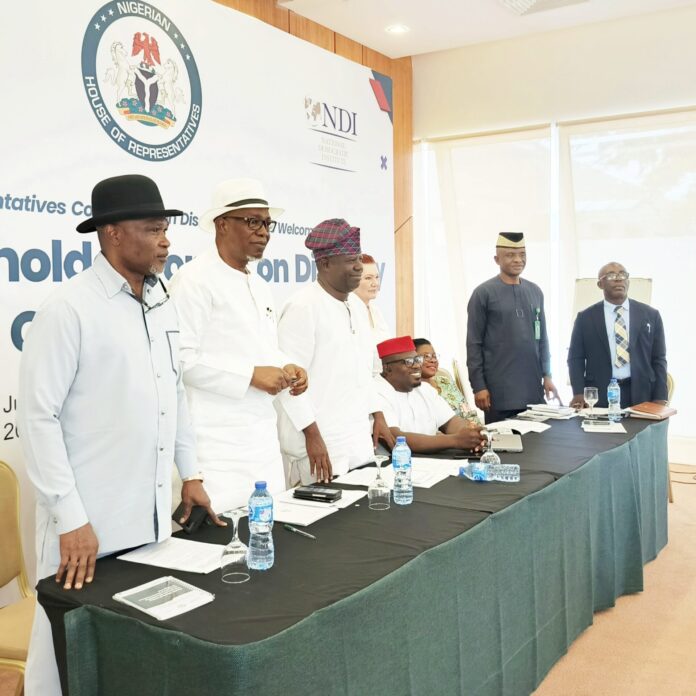Amidst the growing economic challenges in Nigeria, Persons With Disabilities (PWDs) have called for an amendment to the 2018 Disability Act to ensure that 10 percent of all social investment programmes from Ministries, Departments, and Agencies (MDAs) are allocated specifically for them. This demand was made on Tuesday during the Multi-Stakeholder Forum on Disability Inclusive Governance in Nigeria, an event organized by the House of Representatives in collaboration with the National Democratic Institute (NDI) and the Accelerate Disability Inclusion in Emergencies Forum (ADIE).
Christian Agbo, the Co-Chair of ADIE, voiced the concerns and proposals of PWDs during the forum. He highlighted the severe impact of Nigeria’s current economic policies on the disabled community, stating, “Persons With Disabilities have been the worst hit by Nigeria’s current economic challenges. The fuel subsidy removal policy, floating of the Naira, and the astronomical increase in electricity tariffs have made basic living very difficult for Nigerians, especially Persons With Disabilities.”
Agbo emphasized that the forum was convened not to complain but to seek solutions. He noted, “We have enormous challenges but we are not here to complain. We have come to be part of the solution. Indeed, this Forum is about solutions. To proffer solutions to this problem, we have been putting forward recommendations including the following since July 2023.”
Among the recommendations, Agbo highlighted the need for dedicated social intervention programmes for PWDs at all government levels. He proposed establishing reliable databases of PWDs, setting up food banks for equitable distribution of economic palliatives, and providing targeted financial assistance. Central to these proposals is the call for a legislative amendment: “We will be proposing an amendment to the Disability Act to make it mandatory for 10 percent of the social intervention programmes of all Federal Ministries, Departments, and Agencies of government to be dedicated to Persons With Disabilities. The 10th House of Representatives earlier passed a resolution on this but we need to give that resolution legal teeth.”
Agbo also called on the federal government to halt further increases in taxes, tariffs, and duties to alleviate the financial strain on Nigerians. He commended the recent five-month duty-free import policy for food items such as maize, rice, and wheat but stressed the need for more such measures. “While we understand the financial difficulties that the government is facing, we call on the federal government to halt further increases of all taxes, tariffs and duties to enable Nigerians to breathe,” he said.
In addition, ADIE urged the introduction of an affordable and accessible public transportation system for PWDs. This includes discounted or free transportation vouchers, passes, or dedicated transportation services. Agbo criticized the procurement of commercial buses that lack necessary accessibility features, stating, “Commercial buses procured now or in the future that do not have adjustable ramps and handrails for wheelchair users, signage and electronic display for directions with audio announcements for the benefit of the deaf and the blind, exclude the 35 million citizens with disabilities in our country.”
The forum, which aimed at fostering inclusive governance, saw a strong commitment from the legislative arm of government. Declaring the event open, Speaker of the House of Representatives, Dr. Tajudeen Abbas, represented by House Leader Hon. Julius Ihonvbere and Majority Leader Hon. Kingsley Chinda, reaffirmed the 10th Assembly’s dedication to inclusivity. “We expect that the outcome of this confab will add value to what we are doing in our legislative assignment,” said the Speaker in a speech read by Mr. Chinda.
Chairman of the House of Representatives Committee on Disability, Dr. Bashiru Dawodu, shared insights into the legislative efforts to ensure the implementation of the Disability Act. He recalled the introduction of a sign language interpreter during plenary sessions and noted ongoing investigations into MDAs’ compliance with the Act. “Our committee has the mandate to investigate the compliance and implementation of the law. We have started that and in the nearest future, you will hear from us,” he said. Dawodu emphasized that the focus should be on inclusion rather than charity, reminding attendees that disability can affect anyone at any time.
Kelly Jones, Senior Resident Director of NDI, also addressed the forum, recounting the unique challenges PWDs faced during the COVID-19 lockdown and subsequent economic policies like the fuel subsidy removal. She stressed that the efforts for inclusivity are not about favoritism but ensuring that PWDs have a seat at the table in governance processes. “The efforts around all of this are not necessarily about favoritism but to have a seat at the table,” she said.
The ADIE Forum, a coalition of over 30 Organizations of Persons with Disabilities (OPDs), reaffirmed its partnership with the House of Representatives to ensure that governance processes sufficiently address the socio-economic needs of Nigeria’s 35 million Persons with Disabilities. This collaborative effort aims to drive significant legislative and policy changes that will improve the lives of PWDs and ensure their inclusion in all aspects of Nigerian society.


